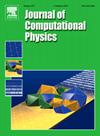非均质介质中时谐声学问题的带传输变量的可杂化不连续伽辽金方法
IF 3.8
2区 物理与天体物理
Q2 COMPUTER SCIENCE, INTERDISCIPLINARY APPLICATIONS
引用次数: 0
摘要
用可杂化不连续伽辽金(HDG)方法研究非均质介质中时谐波传播问题的有限元解。在均匀介质的情况下,已经观察到线性系统的迭代解可以通过混合传输变量而不是在标准方法中执行的数值轨迹来加速。在这项工作中,我们将具有传输变量的HDG方法(称为CHDG方法)扩展到具有分段常数物理系数的异质情况。特别地,我们考虑具有标准逆风通量和一般对称通量的公式。CHDG混合系统可以写成一个不动点问题,可以用一类对称通量的平稳迭代格式来求解。考虑一系列二维数值基准,系统地研究了HDG和CHDG方法在不同数值通量下的性能。在逆风通量和标量对称通量下,扩展CHDG方法的收敛速度总是快于标准HDG方法。本文章由计算机程序翻译,如有差异,请以英文原文为准。
A hybridizable discontinuous Galerkin method with transmission variables for time-harmonic acoustic problems in heterogeneous media
We consider the finite element solution of time-harmonic wave propagation problems in heterogeneous media with hybridizable discontinuous Galerkin (HDG) methods. In the case of homogeneous media, it has been observed that the iterative solution of the linear system can be accelerated by hybridizing with transmission variables instead of numerical traces, as performed in standard approaches. In this work, we extend the HDG method with transmission variables, which is called the CHDG method, to the heterogeneous case with piecewise constant physical coefficients. In particular, we consider formulations with standard upwind and general symmetric fluxes. The CHDG hybridized system can be written as a fixed-point problem, which can be solved with stationary iterative schemes for a class of symmetric fluxes. The standard HDG and CHDG methods are systematically studied with the different numerical fluxes by considering a series of 2D numerical benchmarks. The convergence of standard iterative schemes is always faster with the extended CHDG method than with the standard HDG methods, with upwind and scalar symmetric fluxes.
求助全文
通过发布文献求助,成功后即可免费获取论文全文。
去求助
来源期刊

Journal of Computational Physics
物理-计算机:跨学科应用
CiteScore
7.60
自引率
14.60%
发文量
763
审稿时长
5.8 months
期刊介绍:
Journal of Computational Physics thoroughly treats the computational aspects of physical problems, presenting techniques for the numerical solution of mathematical equations arising in all areas of physics. The journal seeks to emphasize methods that cross disciplinary boundaries.
The Journal of Computational Physics also publishes short notes of 4 pages or less (including figures, tables, and references but excluding title pages). Letters to the Editor commenting on articles already published in this Journal will also be considered. Neither notes nor letters should have an abstract.
 求助内容:
求助内容: 应助结果提醒方式:
应助结果提醒方式:


